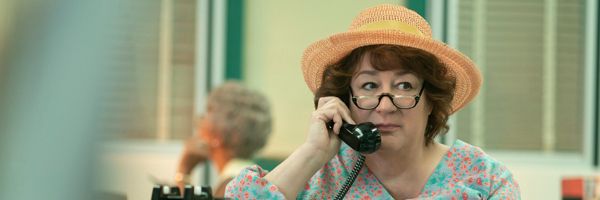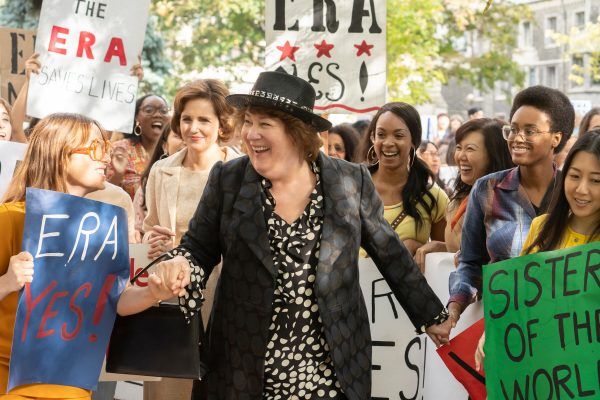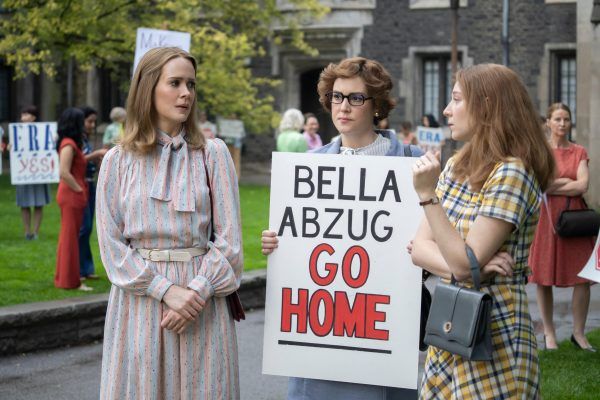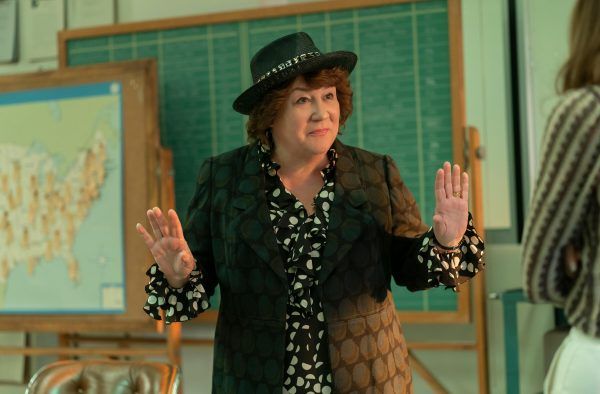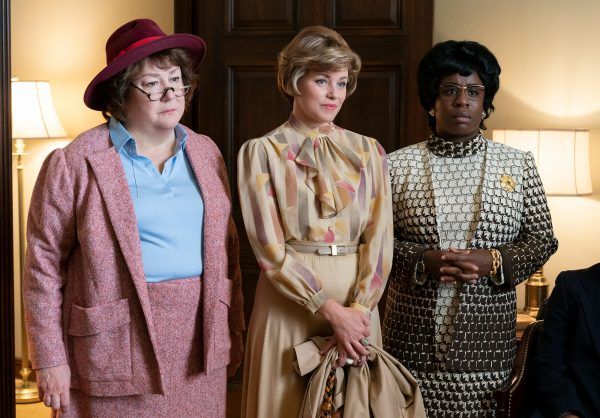lived through the era of history captured by Mrs. America, and so playing the role of activist and U.S. representative Bella Abzug was a very special project to her. "It's been pretty incredible to be part of. It really has, it feels extremely important," she tells Collider.
The Americans and Justified star got the spotlight in the latest episode of the FX on Hulu miniseries, as "Bella" tracks how as a political appointee chairing the National Commission on the Observance of International Women’s Year, Bella was responsible for planning for the National Woman's Conference — and thus found herself in the crosshairs of Phyllis Schlafly (played by Cate Blanchett) and her Eagle Forum of women who oppose the Equal Rights Amendment. Abzug was an essential part of the 1970s women's movement, famous for her hats and humor, and Martindale says that "I feel privileged to have gotten to play her."
While Mrs. America was a true honor for her, it was also an education. Growing up, there was never any doubt in Martindale's mind that men and women should be treated equally, but as she reveals below, until she started working on the series, she also wasn't aware of the fact that the ERA had never actually passed in the United States — not to mention everything it took for women to get as far as they did in the battle for equal rights.
Martindale also explains how memories of her mother affected her relationship with Bella's iconic hats, and reveals what she's been binge-watching in the COVID-19 era.
Now that it's airing, are people talking to you about just what they're learning about that period of history?
MARGO MARTINDALE: Well, so many people as myself, learns stuff that they never knew to begin with. And so many young women just didn't even know this part of history. So yeah, a lot of people are talking about it.
What were some of the things that you didn't know?
MARTINDALE: Most of it. I was right there in the middle of it: I moved to New York in '74 on the Upper West Side, after I went to school in Ann Arbor, Michigan, a very wonderfully political place, and then went to Harvard for an acting stint. But I really thought only about acting and boys.
I knew of Bella, I saw her in the news, saw her in pictures and magazines. I was never around her, but she had a huge profile on the Upper West Side in New York at the time.
[By making the show] I've learned so much about politics that makes me a lot more knowledgeable, and things that I didn't know about the way to get things done. Because I'm playing a politician, really. She was the only politician of the group. And the way to get things done is to sometimes put the things you're most passionate about in second place. She was an incredibly smart, funny, outspoken, passionate person.
That really comes out in "Bella," especially in the scene where she's confronting the women from the Eagle Forum. And she's just like, "Thank you for spelling my name right."
MARTINDALE: Yeah. I love all of that. And also, "Congratulations, you're working girls." Which was so good. I love how she sneaks that up on them.
Yeah, it speaks to one of the things that is so interesting about the show, is just the idea that there are two sides to the fight, but at the same time, everyone is in the same fight.
MARTINDALE: In the same fight. Absolutely. You know, their fight is different than our fight. Their organization is more clearly single-minded. Ours is trying to satisfy a lot of voices, because that's the democratic way. Sometimes it's harder to get things done the democratic way. [Mrs. America] shows both sides and I think it lets you think about that, ruminate on it and make your own decision. I like that about the show too.
Yes, like the fact that it lets Phyllis Schlafly be a real character, a real person, which includes not hiding the fact that she did some things which were not great.
MARTINDALE: They were not great. That's the truth.
It's funny — my parents asked me if they should watch the show, just basically because they felt that "We lived through Phyllis Schlafly's time in the spotlight. We don't need necessarily to relive it."
MARTINDALE: Well, that's interesting. You see, I only remember hints of her movement floating around me. That even just the whole fact that the fear that she turned up — things like asking "Do you want to be drafted?" I didn't want to be drafted, so that made me a little bit afraid. But I didn't want anybody to be drafted. I was completely against the war. I didn't want anybody to go to war. Of course, that's the way we thought then. But [Schlafly] did create a lot of fear. She churned it all up and let it fly out of there. It's very similar to now.
One thing about Bella — this is going to sound like a superficial question initially, but what was it like getting to explore the wonderful world of her hats?
MARTINDALE: It was interesting, very, very interesting to me, because hats are nothing I wear. My mother wore hats all the time and she looked fantastic in them, but she had a collection of hats. And when she died, all of her friends came and got one of her hats, which was pretty incredible. And they'd sit around in her hats after that. And that's the first time I've said that. I've forgotten about that.
My image of Bella was always with a wide-brimmed hat. Now of course [costume designer Bina Daigeler], being the incredible designer that she is, gave me pictures of hats that Bella had that weren't all wide-brimmed. I said, "But the problem Bina, for me, is that my chin is wide-brimmed. So you need to balance it out with the wide-brimmed hats." I liked the bigger hats better. Those other hats were sensational. I wore what she wanted me to wear, quite honestly, and was happy to do it.
What's interesting is that at the Television Critics Association press tour this January, you talked about how your image of Bella was "that woman in the hat." When somebody gets defined by something like that, it's like they become almost an icon.
MARTINDALE: Well, that was what she did. Like I say in one of the episodes, my mother told me to wear a hat and gloves, so they'd never mistake me for a secretary. And she always wore a hat in public.
I wanted to take the hat off in places where I felt she was wanting to let her nonpolitical self out — certainly at home, and when I went to talk to Betty, my old friend who, even though we had our differences, I felt very at home with. But any time I took it off, there was a discussion about taking it off.
Over the years, you've gotten to play this incredible array of formidable women, but it feels like something very special when you get a scene like that scene with Betty, where you talk about your miscarriage, and that you get to really be vulnerable.
MARTINDALE: Yeah, it was great. And when I ask her, "Do you miss our days of being radicals?" And Betty's, "I think it's great, we're winning." Or whatever it is she says. But then it's a loss of something, a loss of our passion, and fighting for a cause. A little more moving to the middle, a little more of growing up I guess, I don't know, but our growing old.
But also, if the movement is going to evolve and become something that's real and permanent, you do have to lose some of the radicalism.
MARTINDALE: I guess so. I guess that's reality. It makes me sad when I watch this show, that the women were so on fire. Their drive and their passion was so strong, they were far more radical than today. There's a loss of something. I don't know, it can't be a loss of youth, but maybe it is. I don't know.
It seems like the repercussions of the ERA never passing, that was a loss that had a real impact on everyone involved.
MARTINDALE: Absolutely. And it still does. The fact that I didn't know it hadn't been ratified when we started this, is embarrassing to me. I thought it had been ratified. Now how crazy is that? I asked my husband, and he said, "It was not." You learn a lot. That's how I've learned a lot.
Well, when you think about it, how absurd is it that there's no language in the Constitution that says women are equal to men? That feels like something that should be in there.
MARTINDALE: No kidding. I always thought we were equal. I really did. I never thought I shouldn't be the top of my class in math. I never thought I shouldn't be the best in biology. I never thought that I shouldn't strive to do the very best I could. And nobody told me I couldn't. So I always thought we were equal. Of course, I guess I didn't realize that I wasn't getting paid as much as men, but I wasn't.
Hopefully, that's a little better now.
MARTINDALE: It is a little better now. That's for sure. It is a little better. Not all the way, but quite a bit better.
Before I let you go, how are you keeping busy these days?
MARTINDALE: I'm watching an enormous amount of television. I go out and look to see what kind of trees I want to plant. I walk around, I walk down the road. We go for drives. We've gone for so many drives. And a lot of cooking, a lot of cooking. Unfortunately, a lot of cooking and a lot of drinking. It's almost time to stop that wagon.
What television are you watching?
MARTINDALE: I've watched ... Let's see, I've watched all of Hollywood. I've watched all of The Plot Against America. Watched all of Unorthodox, watched all of the Harlan Coben shows, The Five and Safe and The Stranger. Watching Belgravia, and loved Halcyon. And they canceled it after one season! I was loving that show. I know there's more, there's so many more, but it's what we do. It's our nighttime entertainment.
Mrs. America is streaming now on FX on Hulu. New episodes premiere Wednesdays.

